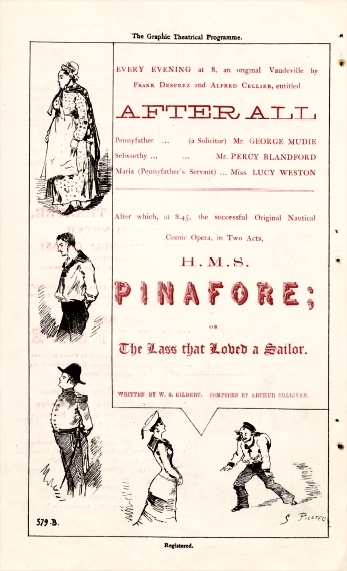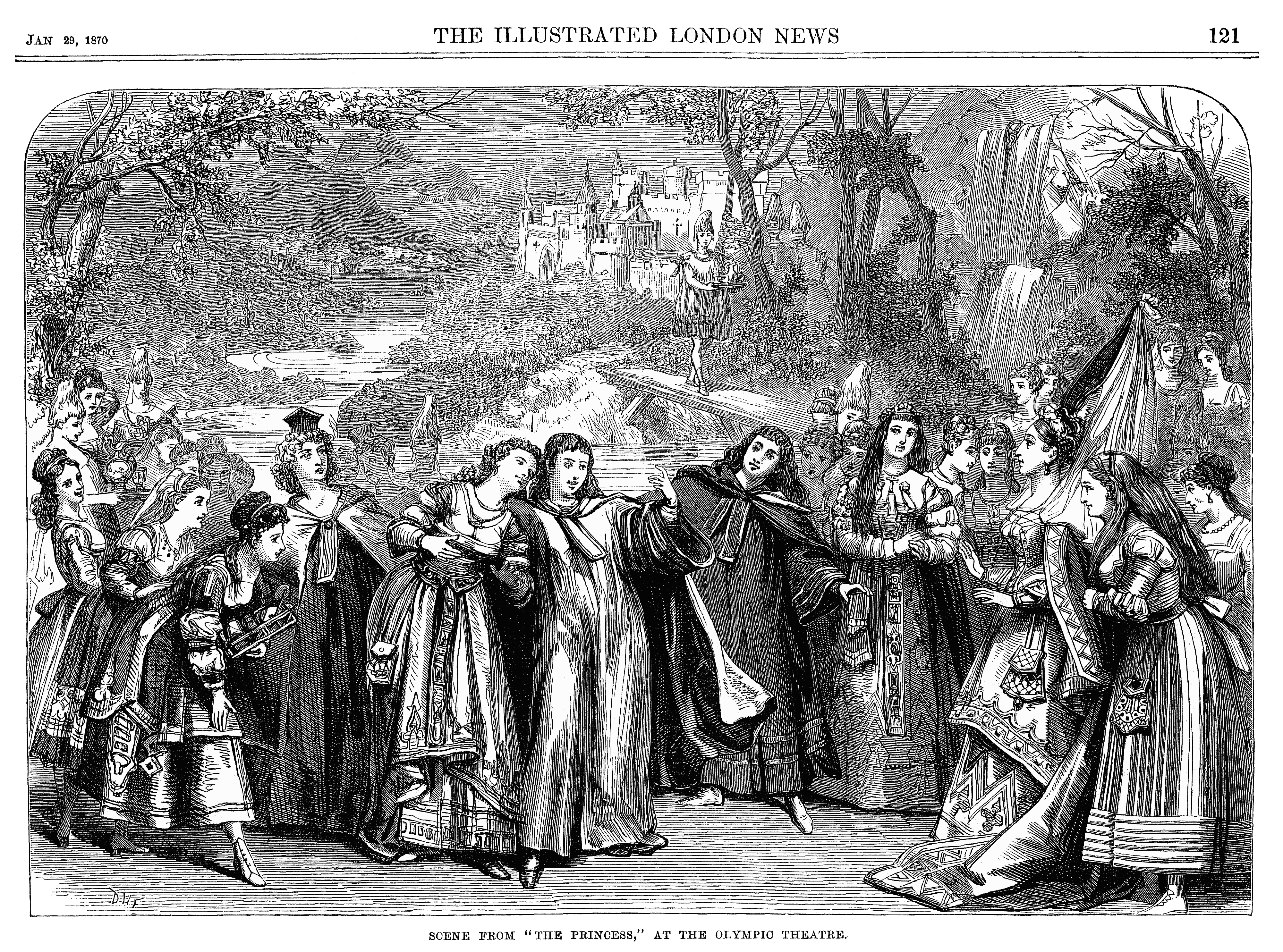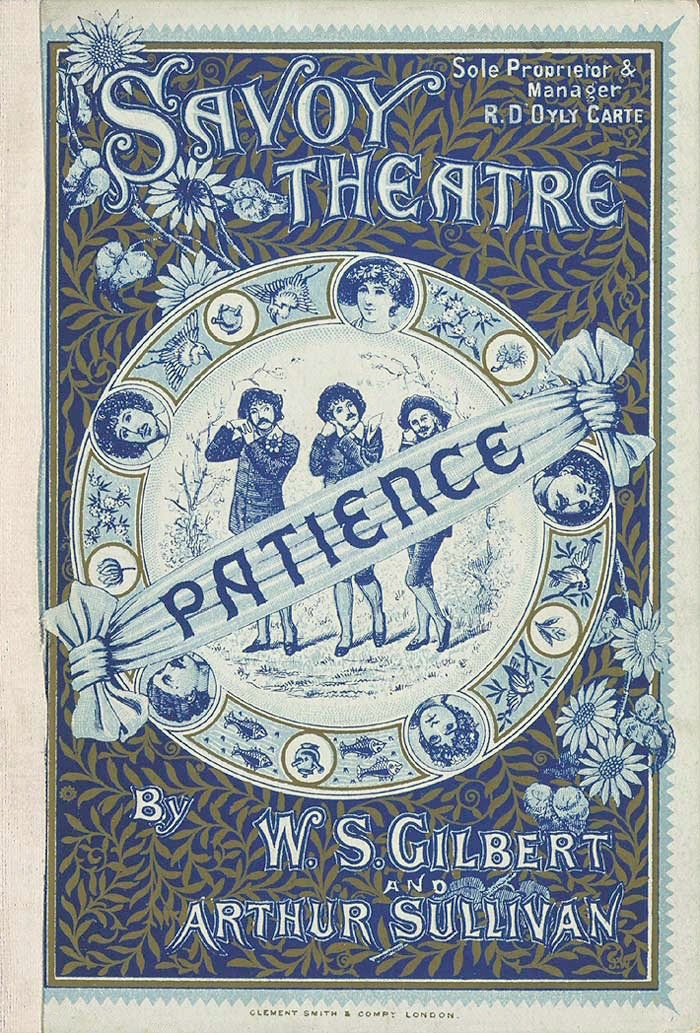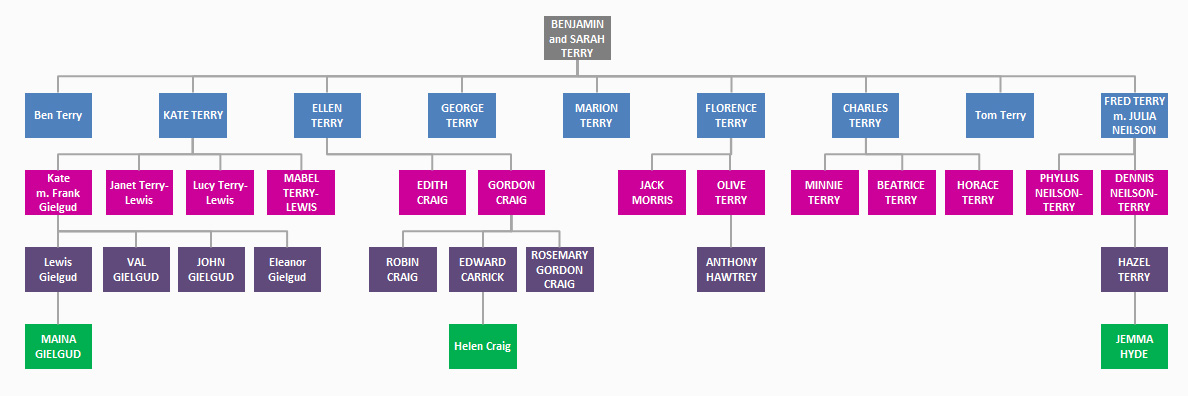|
Frank Thornton (Savoyard)
Frank Thornton (1845 – 18 December 1918) was an English actor, singer, comedian and producer. Despite a successful stage career in comedies in London, on tour and abroad, Thornton is probably best remembered as the understudy to George Grossmith in a series of Gilbert and Sullivan operas from 1877 to 1884. Thornton began his stage career giving drawing-room entertainments while simultaneously working in a commercial office in London, keeping his theatrical activities secret from his office employers for four years. He was engaged by Richard D'Oyly Carte as understudy to George Grossmith in the Gilbert and Sullivan operas, also playing roles in some of the curtain raisers played with the operas. In 1881, he created a small principal role in ''Patience'' and resigned from his office post. In 1883, he played the Lord Chancellor in a tour of ''Iolanthe''. Thornton left the D'Oyly Carte Opera Company in 1884 and began a long series of tours of Australia in stage comedies, notabl ... [...More Info...] [...Related Items...] OR: [Wikipedia] [Google] [Baidu] |
After All!
''After All!'' is a one-act comic opera with a libretto by Frank Desprez and music by Alfred Cellier. It was first performed at the Savoy Theatre under the management of Richard D'Oyly Carte, along with ''H.M.S. Pinafore'' and another short piece, '' Cups and Saucers'', from December 1878 to February 1880. Background and productions During the original run of ''After All'', in 1879, Richard D'Oyly Carte, Gilbert and Sullivan broke up the "Comedy Opera Company" that they had formed in 1877 to present the Gilbert and Sullivan operas. The former directors of that company staged a rival version ''Pinafore'', along with ''After All'', but their versions were not as popular as Carte's. Later, ''After All'' played with the D'Oyly Carte Opera Company children's ''Pinafore'' (and '' In the Sulks''), from February to March 1880; with ''The Mikado'' from November 1895 to March 1896; with ''The Grand Duke'' from April to July 1896; with ''The Mikado'' from July to August 1896; and with '' ... [...More Info...] [...Related Items...] OR: [Wikipedia] [Google] [Baidu] |
Fifth Avenue Theatre
Fifth Avenue Theatre was a Broadway theatre in New York City in the United States located at 31 West 28th Street and Broadway (1185 Broadway). It was demolished in 1939. Built in 1868, it was managed by Augustin Daly in the mid-1870s. In 1877, it became the first air-conditioned theatre in the world. In 1879, it presented the world premiere of ''The Pirates of Penzance'' by Gilbert and Sullivan and the New York premiere of ''H.M.S. Pinafore'', followed by other Gilbert and Sullivan operas throughout the 1880s. The theatre continued to present both plays and musicals through the end of the century. At the beginning of the 20th century, the theatre presented English classics and then vaudeville, and later films, as well as plays and musicals. History The theatre was built in 1868 and was originally named Gilsey's Apollo Hall, in 1870 renamed the St. James Theatre. Its capacity was approximately 1,530 seats. [...More Info...] [...Related Items...] OR: [Wikipedia] [Google] [Baidu] |
Princess Ida
''Princess Ida; or, Castle Adamant'' is a comic opera with music by Arthur Sullivan and libretto by W. S. Gilbert. It was their eighth operatic collaboration of fourteen. ''Princess Ida'' opened at the Savoy Theatre on 5 January 1884, for a run of 246 performances. The piece concerns a princess who founds a women's university and teaches that women are superior to men and should rule in their stead. The prince to whom she had been married in infancy sneaks into the university, together with two friends, with the aim of collecting his bride. They disguise themselves as women students, but are discovered, and all soon face a literal war between the sexes. The opera satirizes feminism, women's college, women's education and Charles Darwin, Darwinian evolution, which were controversial topics in conservative Victorian era, Victorian England. ''Princess Ida'' is based on a narrative poem by Alfred, Lord Tennyson called ''The Princess (Tennyson poem), The Princess'' (1847), and Gilb ... [...More Info...] [...Related Items...] OR: [Wikipedia] [Google] [Baidu] |
Savoy Opera
Savoy opera was a style of comic opera that developed in Victorian England in the late 19th century, with W. S. Gilbert and Arthur Sullivan as the original and most successful practitioners. The name is derived from the Savoy Theatre, which impresario Richard D'Oyly Carte built to house the Gilbert and Sullivan pieces, and later those by other composer–librettist teams. The great bulk of the non-G&S Savoy Operas either failed to achieve a foothold in the standard repertory, or have faded over the years, leaving the term "Savoy Opera" as practically synonymous with Gilbert and Sullivan. The Savoy operas (in both senses) were seminal influences on the creation of the modern musical. Gilbert, Sullivan, Carte and other Victorian era British composers, librettists and producers, as well as the contemporary British press and literature, called works of this kind "comic operas" to distinguish their content and style from that of the often risqué continental European operettas that th ... [...More Info...] [...Related Items...] OR: [Wikipedia] [Google] [Baidu] |
The Pall Mall Gazette
''The Pall Mall Gazette'' was an evening newspaper founded in London on 7 February 1865 by George Murray Smith; its first editor was Frederick Greenwood. In 1921, '' The Globe'' merged into ''The Pall Mall Gazette'', which itself was absorbed into ''The Evening Standard'' in 1923. Beginning late in 1868, at least through the 1880s, a selection or digest of its contents was published as the weekly ''Pall Mall Budget''. History ''The Pall Mall Gazette'' took the name of a fictional newspaper conceived by W. M. Thackeray. Pall Mall is a street in London where many gentlemen's clubs are located, hence Thackeray's description of this imaginary newspaper in his novel ''The History of Pendennis'' (1848–1850): We address ourselves to the higher circles of society: we care not to disown it—''The Pall Mall Gazette'' is written by gentlemen for gentlemen; its conductors speak to the classes in which they live and were born. The field-preacher has his journal, the radical free-thinker ... [...More Info...] [...Related Items...] OR: [Wikipedia] [Google] [Baidu] |
Savoy Theatre
The Savoy Theatre is a West End theatre in the Strand in the City of Westminster, London, England. The theatre was designed by C. J. Phipps for Richard D'Oyly Carte and opened on 10 October 1881 on a site previously occupied by the Savoy Palace. Its intended purpose was to showcase the popular series of comic operas of Gilbert and Sullivan, which became known as the Savoy operas. The theatre was the first public building in the world to be lit entirely by electricity. For many years, the Savoy Theatre was the home of the D'Oyly Carte Opera Company, which continued to be run by the Carte family for over a century. Richard's son Rupert D'Oyly Carte rebuilt and modernised the theatre in 1929, and it was rebuilt again in 1993 following a fire. It is a Grade II* listed building. In addition to ''The Mikado'' and other famous Gilbert and Sullivan premières, the theatre has hosted such premières as the first public performance in England of Oscar Wilde's '' Salome'' (1931) and No� ... [...More Info...] [...Related Items...] OR: [Wikipedia] [Google] [Baidu] |
Julia Gwynne
Julia Gwynne (1856 – 10 June 1934) was an English opera singer and actress best remembered for her performances with the D'Oyly Carte Opera Company from 1879 to 1883. She married producer George Edwardes. Life and career Gwynne was born Julia Lavinia Putney at Marylebone, London, England in 1856 to David Putney and his wife, who owned the 'Black Boy' public house in Hampstead.Hyman, Alan ''The Gaiety Years'', Cassell London (1975) Early career George Edwardes, later Gwynne's husband, was a manager for Richard D'Oyly Carte at the Opera Comique and later Carte's managing director of the Savoy Theatre. He brought Gwynne with him in 1879 to join the chorus in D'Oyly Carte's company in Gilbert and Sullivan's hit opera ''H.M.S. Pinafore''. Gwynne's sister, actress Emma Gwynne (born Emma Putney), also sang in ''Iolanthe'' with Gwynn. During ''Pinafore'', Gwynne was called before the stage manager, Richard Barker, for laughing on stage during a performance. Despite her protest ... [...More Info...] [...Related Items...] OR: [Wikipedia] [Google] [Baidu] |
May Fortescue
May Fortescue (9 February 1859 – 2 September 1950) was an actress, singer and actor-manager of the Victorian era and a protégée of playwright W. S. Gilbert. She was a member of the D'Oyly Carte Opera Company from 1881 to 1883, when she left the company following her engagement to a nobleman, young Arthur William Cairns, 2nd Earl Cairns, Arthur William Cairns, Lord Garmoyle (later the 2nd Earl Cairns). Cairns soon broke off the engagement under pressure from his friends, and Fortescue returned to the stage in leading roles. With the £10,000 that she received in her breach of promise lawsuit, Fortescue started her own touring theatre company, often performing the plays of W. S. Gilbert. Coincidentally, Gilbert visited Fortescue on the day he died. Her acting career continued until 1926. Early career Born Emily May Finney in Kensington, London, to a coal merchant father, Fortescue was educated as a lady, but following her father's business failure she became an actress to s ... [...More Info...] [...Related Items...] OR: [Wikipedia] [Google] [Baidu] |
Marion Terry
Marion Bessie Terry (born Mary Ann Bessy Terry; 13 October 1853 – 21 August 1930) was an English actress. In a career spanning half a century, she played leading roles in more than 125 plays. Always in the shadow of her older and more famous sister Ellen, Terry nevertheless achieved considerable success in the plays of W. S. Gilbert, Oscar Wilde, Henry James and others. Biography Terry was born in England, into a theatrical family. Her birth name was Mary Ann Bessy Terry, and she was nicknamed "Polly".Booth, Michael R"Terry, Marion Bessie (1853–1930)" ''Oxford Dictionary of National Biography'', Oxford University Press (2004), accessed 7 January 2010 Her parents, Benjamin (1818–1896), of Irish descent, and Sarah (née Ballard) (1819–1892), of Scottish ancestry, were comic actors in a touring company based in Portsmouth (where Sarah's father was a Wesleyan minister) and had eleven children. At least five of these became actors: Kate, Ellen, Marion, Florence and Fred. Two ot ... [...More Info...] [...Related Items...] OR: [Wikipedia] [Google] [Baidu] |
Broken Hearts
''Broken Hearts'' is a blank verse play by W. S. Gilbert in three acts styled "An entirely original fairy play". It opened at the Royal Court Theatre in London on 9 December 1875, running for three months, and toured the provinces in 1876. It was revived at the Savoy Theatre in 1882 (with Gilbert playing Florian, alongside Hermann Vezin as Mousta, after an accident incapacitated the actor who was originally to have played Florian).Stedman, Jane W"General Utility: Victorian Author-Actors from Knowles to Pinero" ''Educational Theatre Journal'', Vol. 24, No. 3, October 1972, pp. 289–301, The Johns Hopkins University Press Julia Gwynne played Melthusine. It was revived again in 1883, and yet again in 1888 starring Marion Terry in February and Julia Neilson in May, and also at Crystal Palace that year. There was also a New York City production at the Madison Square Theatre. Background and analysis ''Broken Hearts'' was the last of several blank verse "fairy comedies" created by G ... [...More Info...] [...Related Items...] OR: [Wikipedia] [Google] [Baidu] |
Florence Terry
The Terry family was a British theatrical dynasty of the late 19th century and beyond. The family includes not only those members with the surname Terry, but also Neilsons, Craigs and Gielguds, to whom the Terrys were linked by marriage or blood ties. The dynasty was founded by the actor Benjamin Terry and his wife, Sarah. The first member of the family to achieve national prominence was their eldest surviving daughter, Kate. Her younger sister Ellen achieved international fame, in partnership with Henry Irving. Ellen Terry was seen as the greatest star of the family for many decades, but her great-nephew John Gielgud became at least as celebrated from the 1930s to the end of the 20th century. Among those of the family who did not become actors, Gordon Craig, Ellen's son, was an internationally-known theatre designer and director. Members of the family who were professionally associated with the theatre, as performers, designers or managers, are given individual paragraphs below. ... [...More Info...] [...Related Items...] OR: [Wikipedia] [Google] [Baidu] |




